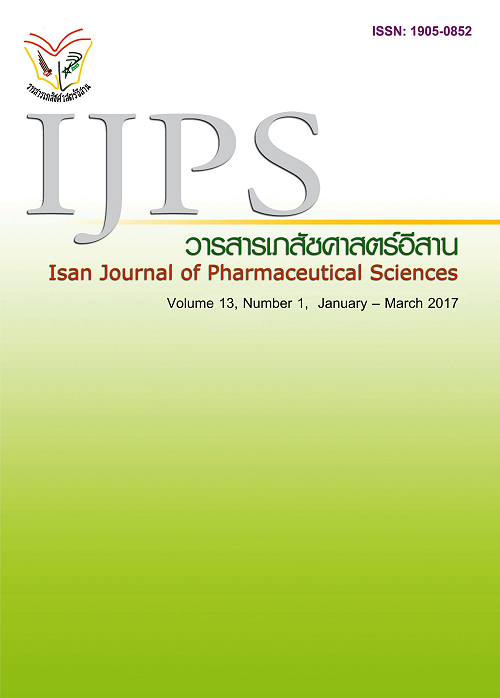Effect of integrated learning to learning outcome of pharmacy students.
Main Article Content
Abstract
The objectives of this study were to evaluate 5 learning outcomes of integrated learning in the project “Health promotion of geriatric patients who have chronic disease in Khruawan community 1) knowledge of hypertension and diabetes mellitus 2) skill of blood pressure and blood sugar measurement 3) attitude towards health care and drug use 4) drug related problem assessment and 5) community skill. The target group of this study was 111 4th year pharmacy students in the first semester of academic year of 2014 at Mahasarakham University. Data were collected during the October-November 2014. Student must integrated knowledge and skill from curriculum for chronic patient care comprise drug use and health education, blood pressure and blood sugar measurement and monitoring, compliance, drug related problem assessment and solving. Patients were monitor 3 visits in the community. The study result found that after project 1) the average knowledge scores was increased significantly (19.22 ±2.79 and 20.79± 2.37 p < 0.001). 2) student’s skill of blood pressure and blood sugar measurement was increased significantly 3) student’s attitude was increased significantly (4.45±0.43 and 4.58±0.48, p = 0.013). 4) drug related problem assessment in the part of adverse drug reactions assessment and 5) community skill in the part of education for health problem and drug related problem prevention to the patients in community were increased significantly (p = 0.016).This study showed that integrated learning, “Health promotion of geriatric patients who have chronic disease in community, improve student’s knowledge, skill and attitude for healthcare in geriatrics with chronic disease. The findings could be used to developed the integrated teaching and learning in community.
Article Details
In the case that some parts are used by others The author must Confirm that obtaining permission to use some of the original authors. And must attach evidence That the permission has been included
References
Akanankul S, Jiranusonkul S, Wongsinsub C. Integrated learning in pharmacy. 1st ed. Chiangmai: Chiangmai University; 2012. p.13-6.
Assawasowan J, Makkasaman W, Nowyenpon P, Kanchanachatree S. The development of integrated instructional model with provision of experience based on the constructivist concepts to develop analytical thinking and learning achievement of prathom suksa 3 students. Princess of Naradhiwas University Journal 2013: 81-95.
Azer SA, Hasanato R, Al-Nassar S. Introducing integrated laboratory classes in a PBL curriculum: impact on student’s learning and satisfaction. BMC Medical Education, 2013;13:71.
Bruce F, Rose A .Integrated teaching methods: theory, classroom applications, and field-based connections. Virginia: Delmar Publishers;1998.
Davies K. The management of learning. London: Mcgraw-hill, 1971.
Harrow A. A taxonomy of the psychomotor domain. A guide for developing behavioral objectives. New York: MCKA, 1972: 96-9
Huwendiek S, Duncker C, Reichert F. Learner preferences regarding integrating, sequencing and aligning virtual patients with other activities in the undergraduate medical curriculum: A focus group study. Medical Teacher, 2013;35:10.
Jadesadawiroje S. Curriculum development, integration of learning and career and technology . Journal of Education and Social Year 5; Vol.1-2: 2003: 25.
Jedtawirod S. Integrated in school. GotoKnow[Online]. 2002 [Cited 8 Aug. 2014]. Available from: http://www.gotoknow.org/posts/400257
Junreung P. The development of integrated teaching thinking skills and creativity. Journal of Education, 2010;1: 27-35.
Keijsers CJ. Education on prescribing for older patients in the Netherlands: a curriculum mapping. Eur J Clin Pharmacol, 2015;71:603-9.
Kitphati W. Integrative pharmacy. 1st ed. Bangkok: Mahidol University; 2012. p. 41-9.
Kunarak K. Integration instruction. Bangkok: Prachaseuksa; 1979. p. 21-2.
Layne CM, Strand V, Popescu M, Kaplow JB. Using the core curriculum on childhood trauma to strengthen clinical knowledge in evidence-based practitioners. Journal of Clinical Child & Adolescent Psychology, 2014;43:11-7.
Limratana N. Evaluation and assessment. PSU Medical Education Resources 2008:1-9.
Lowe J. el al. Educating masters of public health students on tobacco control and prevention: An integrated curriculum approach. International Electronic Journal of Health Education, 2007; 10: 27-34.
Maneechod T. Instruments measure the learning of the students [Online]. 2009 [Cited 15 Aug. 2014]. Available from: http://www.rd.rmuti.ac.th/newweb/fmanager/files/2Tiwat.doc
Phimaly W, Paktipat W. Integrative pharmacy. 1st ed. Mahasalakham: Mahasalakham University; 2012. P. 26-30.
Phonchai B. Case based learning. 1st ed. Nakhon si thammarat: Walailak University; 2012. p. 64-67.
Phosuya C, Chowwanapoonpohn H, Ruenta Y, WienthongP, Permsuwan U. Attitudes of the fifth year pharmacy students at Chiangmai University toward the pharmaceutical care subject. Thai Journal of Pharmacy Practice 2009; 1: 109-17.
Phunphol S. The integration course in pharmacy for services to the society. Bangkok: Siam University; 2012. p.111-3.
Pike EV et al. Development and evaluation of an integrated asthma awareness curriculum for the elementary school classroom. Journal of Urban Health: BNYAM, 2011; 88: 561-7.
Raymond JE, Homer CS, Smith R, Gray JE. Learning through authentic assessment: an evaluation of a new development in the undergraduate midwifery curriculum. Nurse Education in Practice, 2013;13:471-6.
RungreungTum S. Teaching strategies. Bangkok: Rungreung; 1979.
Saramunee K et al. Community learning program integrated in PharmD curriculum. Indian Journal of Pharmaceutical Sciences 2014:1-19.
Simpson E. The classification of educational objectives in the psychomotor domain: The psychomotor domain. Vol. 3. Washington, DC: Gryphon House, 1972.
Sirimuy N. The ability to create concepts and achievement. Bangkok: Srinakharinwirot University; 1986.
Sutajit N. Educational Measurement and Evaluation. Bangkok: Office of the Higher Education Commission 2014:1-22.
Sutayatum PH. Teaching effectively. Bangkok: Ruenkaew Printing ; 1980.
Suwannaphom P, Chowanaphonphol H, Suttajit S. Integrated learning in pharmacy. Chiangmai: Chiangmai University; 2012. p.9-12.
Thamasirikwun P. Curriculum development, integration of learning and career and technology . Journal of Educational and Social Development, 2009;2: 117-30.
Wongpoowarak R. Problem based learning with case study. 1st ed. Songkla: Prince of songkla University; 2012. P. 93-7.


